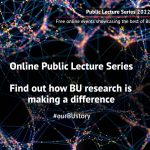 When I talk about public engagement to colleagues, one of the first activities that often springs to mind is to give a public lecture, which can be a fantastic way of engaging a large number of people and promoting a lively debate. However, I am sure that we have all experienced (or endured?) public talks that have left us feeling a little deflated. So what can we do to avoid the latter scenario?
When I talk about public engagement to colleagues, one of the first activities that often springs to mind is to give a public lecture, which can be a fantastic way of engaging a large number of people and promoting a lively debate. However, I am sure that we have all experienced (or endured?) public talks that have left us feeling a little deflated. So what can we do to avoid the latter scenario?
Writing this post feels slightly patronising; after all as HE professionals the chances are that a significant proportion of your working life is spent giving lectures and talks of some sort. However, devising a lecture that appeals to an often unknown public can present particular challenges, which several colleagues have asked me to provide advice so, so here goes:
The National Coordinating Centre for Public Engagement has developed a handy guide, which can be found here. The guidance, I am sure, will not be of great surprise to many readers of this blog, but could be a useful reminder when preparing a public lecture.
I’ve reviewed some of the other sources of information about the ingredients of a great public lecture, which you may find help to consider to preparing your proposal for the Festival of Learning:
- Remember that most people’s optimum concentration span is about 20 minutes, so ensure that you bear this in-mind when planning your event.
- Interactive props can be a great way of ensuring that your audience stays engaged, especially those which stimulate different senses. This could include short sound or video clips, food tasting or interjections from, for example, a beneficiary of your research.
- Ensure that you have plenty of time for lively discussion
- To maximise the discussion, this carefully about who will chair the event and the techniques they will use to facilitate discussion.
- Keep the topic broader than you might if you were giving a presentation at an academic conference.
- Look to use tools such as twitter to add an extra dimension to your event, and give participants that are not confident at speaking in-front of the whole audience an opportunity to get involved in discussion.
Just a couple of examples of public lectures can be found here and here – there are many more, so please contact me if you would like some more examples.
There are lots of other areas of guidance on how to develop a great public lecture which are more topic specific, so please do not hesitate to contact Becca on redwards@bournemouth.ac.uk or 01202 961206.
 Public Lecture Afternoon
Public Lecture Afternoon Global interest in BU’s first online public lecture series
Global interest in BU’s first online public lecture series










 REF Code of Practice consultation is open!
REF Code of Practice consultation is open! BU Leads AI-Driven Work Package in EU Horizon SUSHEAS Project
BU Leads AI-Driven Work Package in EU Horizon SUSHEAS Project Evidence Synthesis Centre open at Kathmandu University
Evidence Synthesis Centre open at Kathmandu University Expand Your Impact: Collaboration and Networking Workshops for Researchers
Expand Your Impact: Collaboration and Networking Workshops for Researchers ECR Funding Open Call: Research Culture & Community Grant – Apply now
ECR Funding Open Call: Research Culture & Community Grant – Apply now ECR Funding Open Call: Research Culture & Community Grant – Application Deadline Friday 12 December
ECR Funding Open Call: Research Culture & Community Grant – Application Deadline Friday 12 December MSCA Postdoctoral Fellowships 2025 Call
MSCA Postdoctoral Fellowships 2025 Call ERC Advanced Grant 2025 Webinar
ERC Advanced Grant 2025 Webinar Update on UKRO services
Update on UKRO services European research project exploring use of ‘virtual twins’ to better manage metabolic associated fatty liver disease
European research project exploring use of ‘virtual twins’ to better manage metabolic associated fatty liver disease